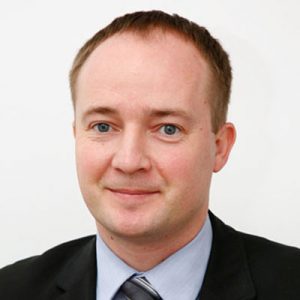Instytut Techniki Budowlanej

dr hab. inż. Tomasz Godlewski, prof. ITB, Zakład Konstrukcji Budowlanych i Geotechniki
Od 2001 r. pracownik naukowy zatrudniony w Instytucie Techniki Budowlanej, obecnie w Zakładzie Konstrukcji Budowlanych, Geotechniki i Betonu na stanowisku profesora. Pełni funkcję kierownika Pracowni Geotechnicznej i zastępcy kierownika Zakładu. Ukończył studia w specjalności geologia inżynierska oraz studia na kierunku budownictwo. W 2008 r. w ITB uzyskał tytuł doktora nauk technicznych w zakresie budownictwa, a w 2020 r. stopień doktora habilitowanego w dyscyplinie inżynieria lądowa i transport nadany przez RND PW.
Jako pracownik ITB opracował ponad 170 ekspertyz i opracowań dotyczących posadowienia różnych obiektów budowlanych, dokumentacje badań podłoża i projekty geotechniczne oraz prowadzi nadzory geotechniczne na budowach (m.in. jako inspektor nadzoru w zakresie geotechniki przy rozbudowie metra w Warszawie). Jest autorem i współautorem ponad 90 publikacji naukowych dotyczących praktycznych zagadnień geotechnicznych, szczególnie związanych z wykonywaniem i interpretacją badań in situ oraz z ustalaniem parametrów geotechnicznych do projektowania, prezentowanych na konferencjach, sympozjach krajowych i zagranicznych oraz publikowanych w prasie technicznej. Jest także współautorem pierwszego w Polsce poradnika dotyczącego projektowania geotechnicznego wg EC7 (Projektowanie geotechniczne według Eurokodu 7, ITB 2011) oraz współautorem monografii Badania Podłoża Budowli, PWN 2020. Główną dziedziną zainteresowań naukowych jest dokumentowanie warunków podłoża w badaniach polowych i laboratoryjnych, w tym z wykorzystaniem metod sejsmicznych oraz analiza współpracy układu konstrukcja–podłoże do realizacji głębokich wykopów, stacji i tuneli metra, oraz obiektów energetyki, w tym turbin wiatrowych. Działa również jako członek zespołu normalizacyjnego Komitetu Technicznego 254 ds. Geotechniki przy PKN oraz jest delegatem na posiedzeniach komitetów CEN TC250/SC7 (Eurokod 7 Committee) i CEN/TC 341 (Geotechnical Investigation and Testing) oraz członkiem Komitetu TC 206 (Observation Method) przy ISSMGE. Jest także członkiem zarządu Podkomitetu Budownictwa Podziemnego przy PKG.
Determination of geotechnical parameters for the foundation of offshore objects based on laboratory tests
Geopolitical and climate conditions force us to effectively search for alternative energy sources. Wind energy is one of the possibilities, while location restrictions are causing a growing interest in the implementation of such installations in offshore conditions. Optimization of the foundation of such objects requires appropriate quality of ground recognition and a package of geotechnical parameters selected for the design needs. In addition to the description of the mechanical properties resulting from the statics of the object, there are parameters describing the behavior associated with dynamic interactions that are transferred to the ground. The economy and safety of off-shore structures requires comparing the values of the natural vibrations of a system consisting of a supporting structure with the often dynamic forcing properties resulting from the rotor rotational speed, the natural vibrations of the rotor lobes and other turbine or platform components, and forced water waves. These factors determine the scope of geotechnical research, including the regime of conducting laboratory tests in advanced measurement devices, i.e. a direct simple shear apparatus and a triaxial apparatus with system of internal measurement and bender elements, in the range of static and dynamic (cyclic) loads, or measurements in a resonant column. The extended methodology and measurement range of these devices allows for modeling the behavior of offshore objects and assessing the impact of, i.e. possible displacements of the bottom sediment, undermining the foundation, or material damping of the structure from the ground and foundation side. The possibilities and limitations of determining the required geotechnical parameters will be discussed in the paper on the basis of already carried out research in an accredited geotechnical laboratory.
Authors:
T. Godlewski, M. Wszędyrówny-Nast., M. Witowski



